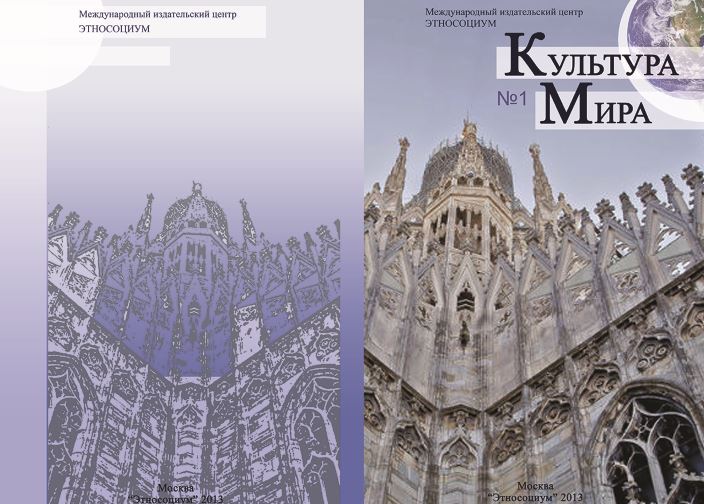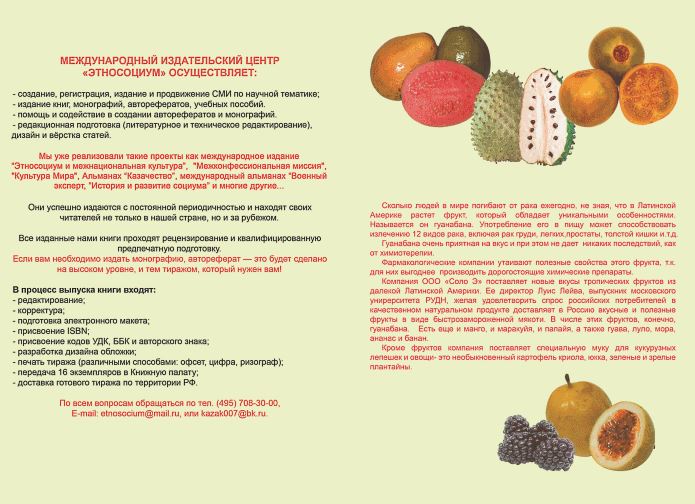
Cultural World
№1
Chief Editor Ryabova E. L. - Doctor of Political Sciences, Professor.
Journal's Editorial board
Belov V.G. - Doctor of economic sciences, Professor, Chairman of the Free Economic Society (Moscow).
Dolgenko A.N. - Doctor of philological sciences, Professor, Head of the Department of Linguistics and Intercultural Communication of the Russian Presidential Academy of National Economy and Public Administration.
Ivakin G.A. - Candidate of historical sciences, Associate Professor of Russian History,Deputy Head of the UMU of the Russian Presidential Academy of National Economy and Public Administration.
Murashko S.F. - Candidate of political sciences, Associate Professor of Russia's foreign policy, Deputy Head of the Department of Linguistics and Intercultural Communication of the Russian Presidential Academy of National Economy and Public Administration.
Naumova G.R. - Doctor of historical sciences, Professor of the Lomonosov Moscow State University, Member of the Academy "Philosophy of Economy".
Nigmatullina T.A. - Professor, Director of the Bashkir Institute of Social Technologies PMO VPO of the Academy of Labor and Social Relations, Head of UNESCO Centre in Russia.
Radchenko A.F. - Candidate of political sciences, Chief of Staff of the Public Chamber of the Russian Federation.
Ternovaya L.O. - Doctor of historical Sciences, Professor of the Moscow Automobile and Road Construction University.
Chapkin S.V. - Deputy Chief Editor, Honorary Professor of the Academy of Ecology and Law.
Yachin S.E. - Doctor of philosophical sciences, Professor, Head of the Department of Philosophy FEFU, (Vladivostok).
Demyanenko Y.A. - Candidate of sociological sciences, Rector VPO Pskov State University.
International Department
Graeme Stowers - political expert (United Kingdom).
Adriano Del Asta - Director of the Italian Cultural Institute.
Yan Vallenius - political expert. (Finland).
Contents
|
Smirnova М.I. The Culture of World is an ambition of world- and peacebuilding in a multiethnic society. (Preface)
|
4
|
|
Geopolitics and Geoculture
|
|
|
Ternovaya L.О. The generality of semiotic codes of geopolitics and geoculture
|
9
|
|
Moshnyaga V.P. From culture of war to culture of peace
|
18
|
|
Russian Culture
|
|
|
Bessonov Е.G., Nekrasov S.М. Culture is a national heritage
|
35
|
|
Schuplenkov О.V. Transcendental dialectics of the Russian Idea
|
43
|
|
Intercultural Communication
|
|
|
Bormotova Т.М. The influence of social prerequisites of migration maintenance on the development of an effective migration policy and its implementation
|
52
|
|
Alieva Sevda Agamirza kyzy. Modern problems of intercultural communication
|
57
|
| Lutsenko A.V. “Neopagan” complex in the minds of modern Europeans |
65
|
|
Shipilov A.V. Russian as the most important factor in cross-cultural communication
|
74
|
|
Cultural World
|
|
|
G. Stowers. GIVE THE UK SOME CREDIT
|
89
|
|
G. Stowers. SCOTTISH INDEPENDENCE BAFFLES PEOPLE ABROAD
|
93
|
|
G. Stowers. POWER OF THE PEOPLE
|
97
|
|
Grigory Ivakin. Development of the conservative-traditionalist ideology in Russia: Black-Hundred movement in the early XX century
|
99
|
|
Zyazikov M. The reflexion of traditions and innovations in the national etiquette of the Ingush
|
108
|
|
Abstracts
|
115
|
|
Authors
|
118
|
Abstracts
Ternovaya O.L.
The generality of semiotic codes of geopolitics and geoculture
Uniting the subject fields of geopolitics and geoculture allows the extensive use of their commune semiotic code for the analysis of the processes occurring in each of these areas. Thus it is possible to enrich geopolitical research with the facts of cultural processes, while saturating geoculture with geopolitical material.
Keywords: geopolitics, geoculture, world map, globe, geographical discoveries.
Moshnyaga V.P.
From culture of war to culture of peace
The article analyzes a complex of world problems, on the resolution of which the efforts of the UN, UNESCO, European structures of the OSCE, Council of Europe, and many other countries and progressive political and social forces are directed. Over the past two decades, a significant work has been carried out for the preparation, adoption and subsequent implementation of the UN Declaration “On a culture of peace” and the Declaration and Programme of action on the culture of peace.
Keywords: peace, culture of peace, a culture of war, the Declaration programme, international cooperation.
Schuplenkov O.V.
Transcendental dialectics of the Russian Idea
In this paper, we analyze the concept of the Russian Idea through the prism of axiological and ethical anthropological value. The Russian national idea formed the immanent essence of these people´s soul and has always lain in the core of the existence of the Russian people who have always been interested in the issues of their own destiny, meaning and purpose of their existence. The answers to these questions are reflected in the Russian idea. It defined its anthropological function, because it is a transcendental method of man’s finding out about his destiny in this world.
Keywords: spirituality, the nation, the idea of Russian, Russian philosophy, consciousness, the structure of ideas.
Bormotova T.M.
The influence of social prerequisites of migration maintenance on the development of an effective migration policy and its implementation
The author focuses on migration issues in the Russian Federation, which are discussed from various angles - state policy regulating migration, interethnic and interfaith relations, social psychology, challenges the «clash of civilizations» ideology of extremism and nationalism, etc.
The author argues that it is of utter importance to develop effective mechanisms in order to influence migration processes, reduce the negative factors for the indigenous population, and for those entering the country, society and state. This should be the basis of migration policy, which is becoming particularly relevant in contemporary Russian society.
Keywords: immigration policy, civil society and migrants.
Alieva Sevda Agamirza kyzy
Modern problems of intercultural communication
The present article deals with the problem of intercultural communication and intercultural relations in the context of globalization. The author analyses communicative aspects of international cultural communication and examines the state of development of the discipline “intercultural communication” in Azerbaijan and in the world.
In the context of global transformation, there is a growing interest in issues of cultural interaction. Today, Azerbaijan is actively involved in international cultural exchanges. That is why understanding of the content and forms of international cultural communication, behavior and psychology of dialogue partners are very important in terms of development of such exchanges.
Cultural globalization confronts humankind with a number of challenges that make it necessary to examine the problems of intercultural communication in a more detailed manner.
Keywords: Cultural globalization, intercultural communication, intercultural exchanges, global transformation.
Lutsenko A.V.
“Neopagan” complex in the minds of modern Europeans
The theme is presented as rather top of the agenda due to several reasons. First of all, the position of religions (which became the source of Neopaganism, e.g. Christianity), according to many researchers, become less and less valuable in modern world. Therefore, the question of the place of Christianity in the near future appears inevitable.
Secondly, in the conditions of overall globalization, a special attention to the problems of national identity and national originality is typical of many branches of Neopaganism.
Keywords: Neopaganism, antichristianity, metacultural dialog, utilitarian mind ,personality, problem of self-identity.
Shipilov A.V.
Russian as the most important factor in cross-cultural communication
In this article, we define the importance and value of the Russian language as the main factor of cross-cultural communication in Kyrgyzstan in the second half of XIX – the beginning of the XX centuries.
Keywords: cross-cultural communication; incorporation; mentality; Russian-native schools; Euroasian space; world languages.
Grigory Ivakin
Development of the conservative-traditionalist ideology in Russia: Black-Hundred movement in the early XX century
The article focuses on the formation of the national parliamentary system at the beginning of XX century, that is, the period of formation of the right-wing political parties with their ideology and policies. The author of the article examines the genesis of the late “narodnik” movement. The author writes about the events that followed the October Revolution and the Civil War and the fate of Black Hundreds in Soviet Russia.
The author of the article analyses the reasons why right-wing conservative parties and unions of Russian immigrants were compromised in the eyes of the Soviet Union, many Russian immigrants and the Western liberal democracies.
Keywords: black-hundred movement, narodnik, October Revolution, Soviet Russia.
Authors
Alieva Sevda Agamirza kyzy, Institute for Human Rights of the National Academy of Sciences of Azerbaijan, candidate of philological sciences.
Bessonov E.G., Head of several projects of the International Publishing House “Ethnosocium”, candidate of philosophical sciences, associate professor of Saint-Petersburg State Agrarian University.
Bormotova Т.М., Federal Migration Service of the Ministry of Internal Affairs of Russia, candidate of social sciences.
Grigory Ivakin., PhD (History), Associate Professor of the Department of History of the Russian Statehood, Deputy Head of the Department for Educational Standards and Programmes, Russian Presidential Academy of National Economy and Public Administration.
Lutsenko А.V., Senior lecturer of the Chair of School for the Humanities FEFU.
Moshnyaga V.P., Doctor of Historical Sciences, professor of Moscow University for the Humanities.
Schuplenkov О.V., Candidate of Historical Sciences, Stavropol State Pedagogical University, senior lecturer.
Shipilov А.V., Candidate of Cultural Studies.
Smirnova M.I., Candidate of Political Sciences, Head of the Project “Cultural World”.
Ternovaya L.О., Doctor of Historical Sciences, professor of MADI.
Zyazikov M., Deputy Plenipotentiary of the President of the Russian Federation in the Central Federal District Doctor of Philosophy, Lieutenant-General.


